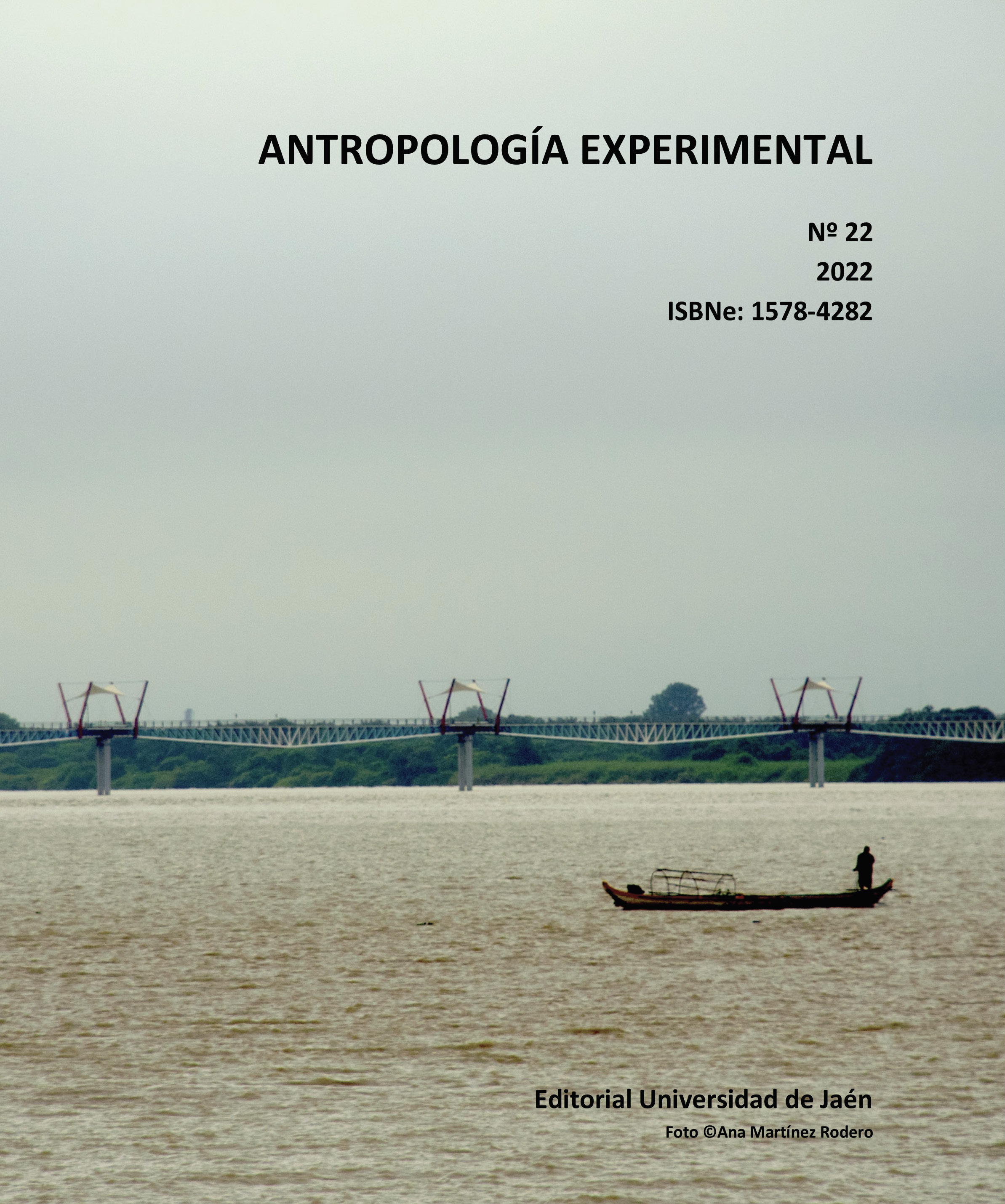Textured counter-archives
Disrupting the colonial archive, an overview of contemporary textile practices in Teotitlán del Valle, Oaxaca, México
DOI:
https://doi.org/10.17561/rae.v22.6570Keywords:
Against Archives. Colonial Archive. Contemporary textile. Decolonization. Teotitlán del Valle, OaxacAbstract
Museums are places that are characterized as neutral but in reality, are often charged with a latent coloniality that represents the very seat of the colonial archive-temple of power because they reflect the material and symbolic dispossession of local heritage. As part of the state idealization and market pressures, we have fallen victim to a folklorization and an imposition of picturesque images that dramatize cultural traditions which hide different conflicting, contradictory and unexpected realities. In an attempt to propose alternatives that contribute to the decolonization of the archive, I will take the opportunity to ground the discussion in textiles, which beyond being decorative or ritual elements, represent a possible decolonizing alternative with a double function: They are archives in itself; but at the same time, they become counter-archives capable of refuting the textuality of the colonial archive. They meanwhile have created their own channels outside the institutional or museum spaces where memories flow and transmute in the form of various archives. Using textile art itself, they confront hegemonic practices, reinventing language and questioning the way in which tradition is viewed, which turns them into means of protest, social action and decolonizing practices.
Downloads
References
Arnold Denise & Espejo, Elvira (2013). El textil tridimensional: la naturaleza del tejido como objeto y como sujeto. La Paz: Fundación Interamericana / Fundación Xavier Albó / Instituto de Lengua y Cultura Aymara.
Caswell, Michelle (2014). Seeing yourself in history: community archives and the fight against symbolic annihilation, The Public Historian, 36(4): 26–37.
Chambers, I (2012). The Museum of Migrant Modernities en Ferrara (ed.) Cultural Memorz, Migrating Modernities and Museum Practices, 13-32. Milan: MELA
Cook Terry & Schwartz Joan M. (2002. Archives, Records, and Power: The Making of Modern Memory Ar-chival Science 2.
De Sousa Santos, Boaventura (2019): El fin del imperio cognitivo: la afirmación de las epistemologías del Sur. Trotta.
Derrida, Jaques (1997): Mal de archivo. Una impresión freudiana. Madrid: Editorial Trotta.
Flinn, Andrew., Stevens, Mary., & Shepherd, Elizabeth (2009): “Whose memories, whose archives? Inde-pendent community archives, autonomy and the mainstream”. Archival Science, 9, pp. 71-86. Con-sultado el 3.06.20: https://doi.org/10.1007/s10502-009-9105-2
Foucault, Michel ([1970] 2002): La arqueología del saber. Buenos Aires: Siglo XXI Editores.
Foucault, Michel (2010): El cuerpo utópico. Las heterotopías. Buenos Aires: Nueva Visión.
Joyce, Patrick (1999). The Politics of the Liberal Archive. In: History of the Human Sciences 12(2): 3549. London: Sage Publications.
Marcus, George Emanuel (1995): Ethnography in/of the World System: The Emergence of Multi-Sited Ethnography Annual Review of Anthropology 24:1, pp. 95-117. Consultado el 13.05.20: https://www.jstor.org/stable/2155931.
Moore, Niamh, Salter, Andrea, Stanley, Liz and Tamboukou, Maria (2016). The Archive Project: Archival Research in the Social Sciences, Oxford: Routledge.
Popple, Simon, Andrew Prescott, and Daniel H Mutibwa (2020): Communities, Archives and New Collab-orative Practices. Bristol: Bristol University Press.
Stoler, Anna Laura (2002): Colonial Archives and the Arts of Governance. Archival Science 2. pp. 87-109.
Stoler, Anna Laura (2010): “Archivos coloniales y el arte de gobernar.” Revista Colombiana de Antropolo-gía, 46(2), pp. 465-496. Consultado el 3.09.20: https://www.redalyc.org/articulo.oa?id=105020003009.
Taylor, Diana (2017) El archivo y el Repertorio, La memoria cultural performática en las Américas. Ed. Universidad Alberto Hurtado, Santiago de Chile.
Medios digitales
“Circuito 8” de Alberto Ruíz (2010) en la exposición: “Arrópame desde los pies: Tapetes tradicionales y actuales” Museo Textil de Oaxaca. Consultado en: https://museotextildeoaxaca.org/arropame-desde-los-pies-tapetes-tradicionales-y-actuales/
“Tilma” de Román Gutiérrez (2008) en sección de obra siglo XXI en la exposición viltual: “Hilar el viento”. Museo Textil de Oaxaca. Consultado en: http://www.museotextildeoaxaca.org.mx/hilarelviento/obra/
“Acción corcholatas” de Alberto Ruíz (2020) en Proyecto al aire libre. Consultado en: https://www.youtube.com/watch?v=h5s6OA5RbFk
“Reapropiación de lo Cotidiano” serie de piezas textiles de Alberto Ruíz (2021) Taller 8. Consultado en: https://www.instagram.com/explore/tags/reapropiaciondelocotidiano/
“Tierra Zapoteca” exposición colectiva (2021) en Centro Cultural Comunitario Teotitlán del Valle. Consul-tado en: https://m.facebook.com/story.php?story_fbid=1426402971066442&id=361541324219284
“Tejiendo sueños” exposición colectiva (2019) en Centro Cultural Comunitario Teotitlán del Valle. Consul-tado en: https://www.facebook.com/TeotitlanDelValle.Net/posts/d41d8cd9/2564556093564584/
“Benizit/The Outlander” tráiler dirigido por Bani Khoshnoudi (2019). Consultado en:
Perfiles personales en redes sociales
Taller 8: https://www.instagram.com/tallerocho8/ y https://www.facebook.com/tallerocho8
Alberto Ruíz: https://www.instagram.com/zaporuiz/
Ismael Gutiérrez: https://www.instagram.com/isma_rugs/ y https://www.tiktok.com/@isma_rugs
https://www.tiktok.com/@isma_rugs?
Personas entrevistadas
Alberto Ruíz Gonzáles nacido en 1979 es un artista textil contemporáneo originario de Teotitlán del Valle Oaxaca. Actualmente es uno de los activistas culturales más importantes de su localidad, trabaja como es curador en el Centro Cultural Comunitario, Lazz Galnazak Xtee Xigyae, Teotitlán del Valle y es fundador de Taller 8, un espacio de experimentación textil fundado en el 2010.
Downloads
Published
Issue
Section
License
Copyright (c) 2022 Mariana Almaraz Reyes

This work is licensed under a Creative Commons Attribution 4.0 International License.
Responsabilidad de los autores: son responsables por las ideas y datos empíricos de los manuscritos, por la fidelidad de la información, por la corrección de las citas, por los derechos para publicar cualquier material incluido en el texto y por la presentación del manuscrito en el formato requerido por la Revista de Antropología Experimental. Un manuscrito enviado a la Revista de Antropología Experimental no debe estar publicado ni haber sido presentado en la misma forma a otro medio de publicación. Así, mismo, los autores reconocen que conocen y están de acuerdos con estas PAUTAS EDITORIALES Y FORMALES. La dirección de la Revista de Antropología Experimental está permanentemente abierta para aclarar cualquiera de los contenidos aquí citados u de cualquier otra índole que surjan en el proceso de publicación de los manuscritos.






